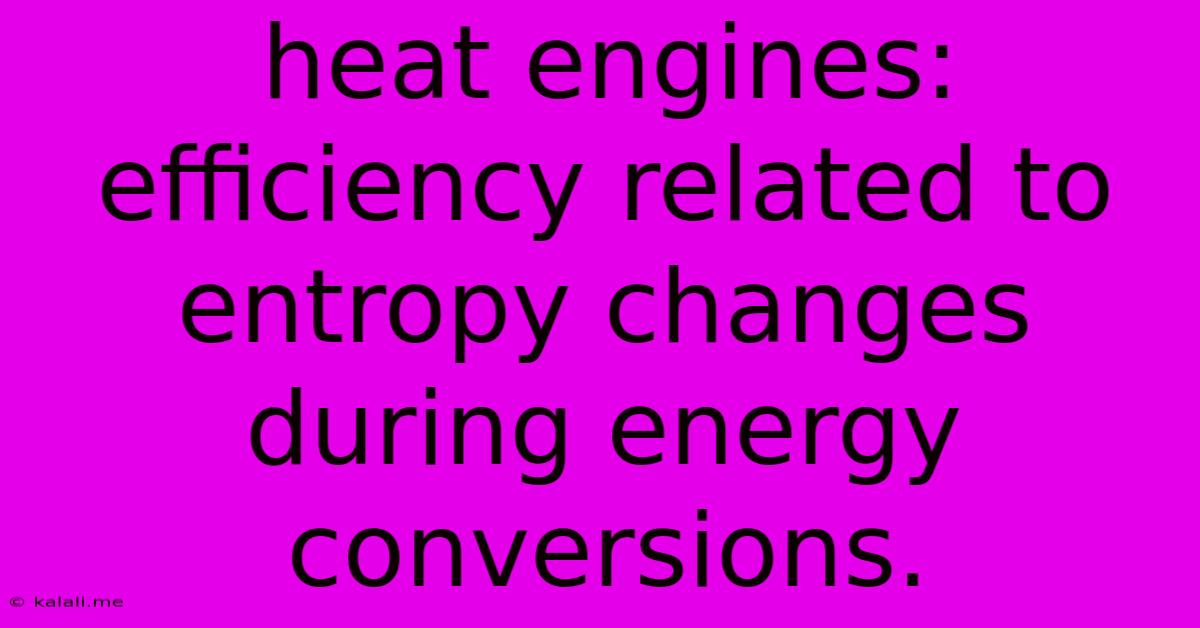Heat Engines: Efficiency Related To Entropy Changes During Energy Conversions.
Kalali
Jun 02, 2025 · 3 min read

Table of Contents
Heat Engines: Efficiency and the Entropy Story
Meta Description: Explore the fascinating link between heat engine efficiency and entropy. Learn how the second law of thermodynamics dictates limitations on energy conversion and how entropy changes impact performance. This article delves into the fundamental principles and provides practical examples.
Heat engines, the workhorses of countless applications from power plants to automobiles, are devices that convert thermal energy into mechanical work. Understanding their efficiency is crucial, and that understanding is deeply intertwined with the concept of entropy. This article will delve into the relationship between heat engine efficiency and entropy changes during energy conversions.
The Carnot Cycle: A Benchmark of Efficiency
The theoretical limit of heat engine efficiency is defined by the Carnot cycle, a reversible thermodynamic cycle operating between two heat reservoirs at different temperatures. This cycle serves as a benchmark against which real-world engines are compared. The efficiency of a Carnot engine is solely determined by the absolute temperatures of the hot (T<sub>H</sub>) and cold (T<sub>C</sub>) reservoirs:
η<sub>Carnot</sub> = 1 - (T<sub>C</sub> / T<sub>H</sub>)
This equation reveals a crucial point: higher temperature differences lead to greater efficiency. However, even the Carnot engine, a theoretical ideal, cannot achieve 100% efficiency. This limitation stems directly from the second law of thermodynamics and the concept of entropy.
Entropy: The Arrow of Time
Entropy is a measure of disorder or randomness within a system. The second law of thermodynamics states that the total entropy of an isolated system can only increase over time or remain constant in ideal cases (reversible processes). In the context of a heat engine, this means that some energy will inevitably be lost as heat to the colder reservoir, increasing the overall entropy of the universe.
This increase in entropy represents an irreversible loss of energy available for work. Even in the ideal Carnot cycle, some heat must be rejected to the cold reservoir to maintain the cycle's reversibility. Real-world heat engines, with their inherent irreversibilities (friction, heat loss through conduction, etc.), experience even greater entropy increases and consequently lower efficiencies than the Carnot limit.
Irreversibilities and Efficiency Losses
Several factors contribute to irreversibilities and decreased efficiency in real heat engines:
- Friction: Mechanical friction within moving parts converts some of the mechanical work into heat, increasing entropy and reducing the net work output.
- Heat Transfer: Heat transfer through conduction and convection between the engine and its surroundings leads to energy loss and increased entropy.
- Combustion Inefficiencies: In internal combustion engines, incomplete combustion leads to wasted energy and increased entropy.
- Expansion and Compression Processes: Deviations from ideal gas behavior during expansion and compression processes further contribute to entropy generation.
Optimizing Heat Engine Efficiency
While we can't eliminate entropy increase entirely, we can strive to minimize it. Strategies for improving heat engine efficiency include:
- Minimizing Friction: Using high-quality lubricants and optimizing engine design to reduce friction.
- Improving Heat Insulation: Reducing heat loss through better insulation and design.
- Optimizing Combustion: Improving fuel-air mixing and combustion chamber design to enhance combustion efficiency.
- Advanced Materials: Utilizing materials with improved thermal properties to enhance heat transfer and reduce losses.
Conclusion
The efficiency of a heat engine is fundamentally limited by the second law of thermodynamics and the inevitable increase in entropy during energy conversion. While the Carnot cycle provides a theoretical upper bound, real-world engines always fall short due to various irreversibilities. Understanding the relationship between efficiency and entropy is crucial for designing and optimizing heat engines for maximum performance and minimizing environmental impact. Ongoing research continues to explore innovative ways to reduce entropy generation and push the boundaries of heat engine efficiency.
Latest Posts
Latest Posts
-
Conventional Current Flows From Positive To Negative
Jun 04, 2025
-
What Does Over Righteous Mean In The Bible
Jun 04, 2025
-
Can An Estate Recover For Defamation
Jun 04, 2025
-
Farberware Countertop Dishwasher Drain Hose Adapter
Jun 04, 2025
-
Full Of Piss And Vinegar Origin
Jun 04, 2025
Related Post
Thank you for visiting our website which covers about Heat Engines: Efficiency Related To Entropy Changes During Energy Conversions. . We hope the information provided has been useful to you. Feel free to contact us if you have any questions or need further assistance. See you next time and don't miss to bookmark.